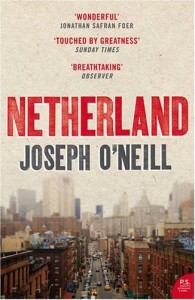 The narrative style was very interesting in this book. In the present, Hans van den Broek is at home with his wife Rachel in London, receiving a phone call to say that his old friend Chuck Ramkissoon has been found murdered in New York. The novel is written more or less as Hans would have thought about Chuck after that phone call – in a jumble of memories, chronologically haphazard and leaping from one anecdote to another more by association than logic.
The narrative style was very interesting in this book. In the present, Hans van den Broek is at home with his wife Rachel in London, receiving a phone call to say that his old friend Chuck Ramkissoon has been found murdered in New York. The novel is written more or less as Hans would have thought about Chuck after that phone call – in a jumble of memories, chronologically haphazard and leaping from one anecdote to another more by association than logic.
Surprisingly, it works very well. Even though the action can be in Brooklyn at one moment and in the Holland of Hans’s childhood the next, I never lost the thread. The novel is just very well put together, and slowly out of these disparate anecdotes a picture builds up of Hans, Chuck and their mysterious friendship.
Another surprising thing about this novel is that I wasn’t particularly interested in Hans or his life, but I kept on reading anyway. The obvious “hook” is the murder of Chuck, stated in the first few pages, and the expectation is that you will find out why he was dumped in the Gowanus Canal with his hands cuffed. But nobody seems very interested – Hans makes a few efforts to call a detective who doesn’t seem to care, and that’s about it. We hear vague allusions to criminal activity, but nothing specific. The novel turns out not to be about Chuck’s murder, or even really about Chuck. It’s about Hans’s attempts to deal with a failing marriage and loneliness in post-9/11 New York City.
To start with, I really disliked Hans. He reminded me a lot of people I knew in a former existence as a corporate banker – from 2000 to 2002 I worked for Citigroup on Wall Street. The emptiness and lack of feeling really depressed me, and I found it hard to care about the problems of such a privileged character – even though I know from personal experience that you can be miserable even when you’re making a lot of money. Hans grew on me as the novel went on, but not very much. So there was really no reason for me to keep reading, but somehow I did, and I enjoyed it. I think it was just the narrative that pulled me along, rewarding me with great descriptions and acute observations about two cities I know very well.
It’s been said that this is a novel about September 11, and also that it’s a novel about cricket, but I don’t think either statement is really true. Both are themes, but there’s a lot else going on. The Netherland of the title is not just about Hans being Dutch. The OED gives the following definition for ‘nether’: “designating a sphere of action or thought existing, or considered as existing below or at a lower level than the usual; esp. in netherland”. The book explores the layers of New York City, the people living below the well-known Manhattan surface, often ignored and unseen. Hans is also in the nether regions of his life – with his marriage falling apart for reasons that are completely obscure to him, he has nothing left but the familiarity of cricket and the comfort of a friendship with a man he knows both a lot and also very little about.
So the reason I liked the book is that Joseph O’Neill is a very good storyteller. The story didn’t grip me and neither did the characters, but I wanted to read on anyway, just for the pleasure of the words on the page and the clever progressions from anecdote to anecdote and tangent to tangent. After 200 pages or so spent with Hans and Chuck and Rachel, I even started to care about them a little more, but ultimately for me the payoff was the deeper themes that came through – about friendship, and loneliness, and memory and loss. It was just a very well-written, well-constructed novel that succeeded in spite of an apparent lack of interesting features.



There are 2 comments
I really enjoyed this book too, particularly as you say, the feel of O’Neill’s words on the page. I liked the cricket theme of the story a lot and the friendships and dramas that played out on the pitch… I read it a while back now, probably nearly a year as my copy was a Christmas present from my brother last year. I remember there being some scenes towards the end in Barnes, London I think which I found especially poignant.
Yes, the cricket theme worked well. I liked how Hans’s batting style was used as a symbol of his resistance to assimilating in America. Also thought it was quite clever how O’Neill managed to make cricket intelligible to a general non-cricketing audience without ever really seeming to explain it in an overt way.